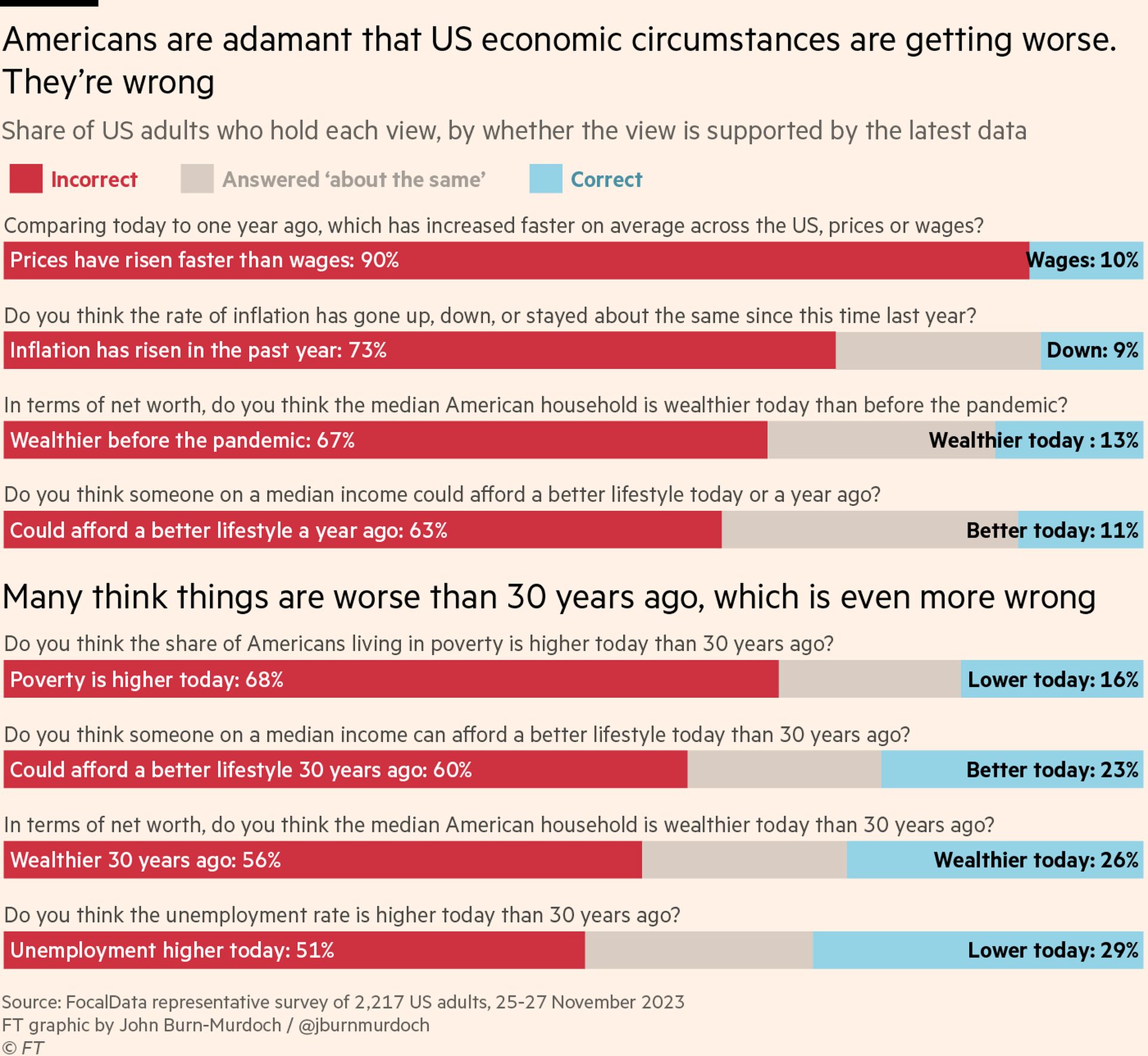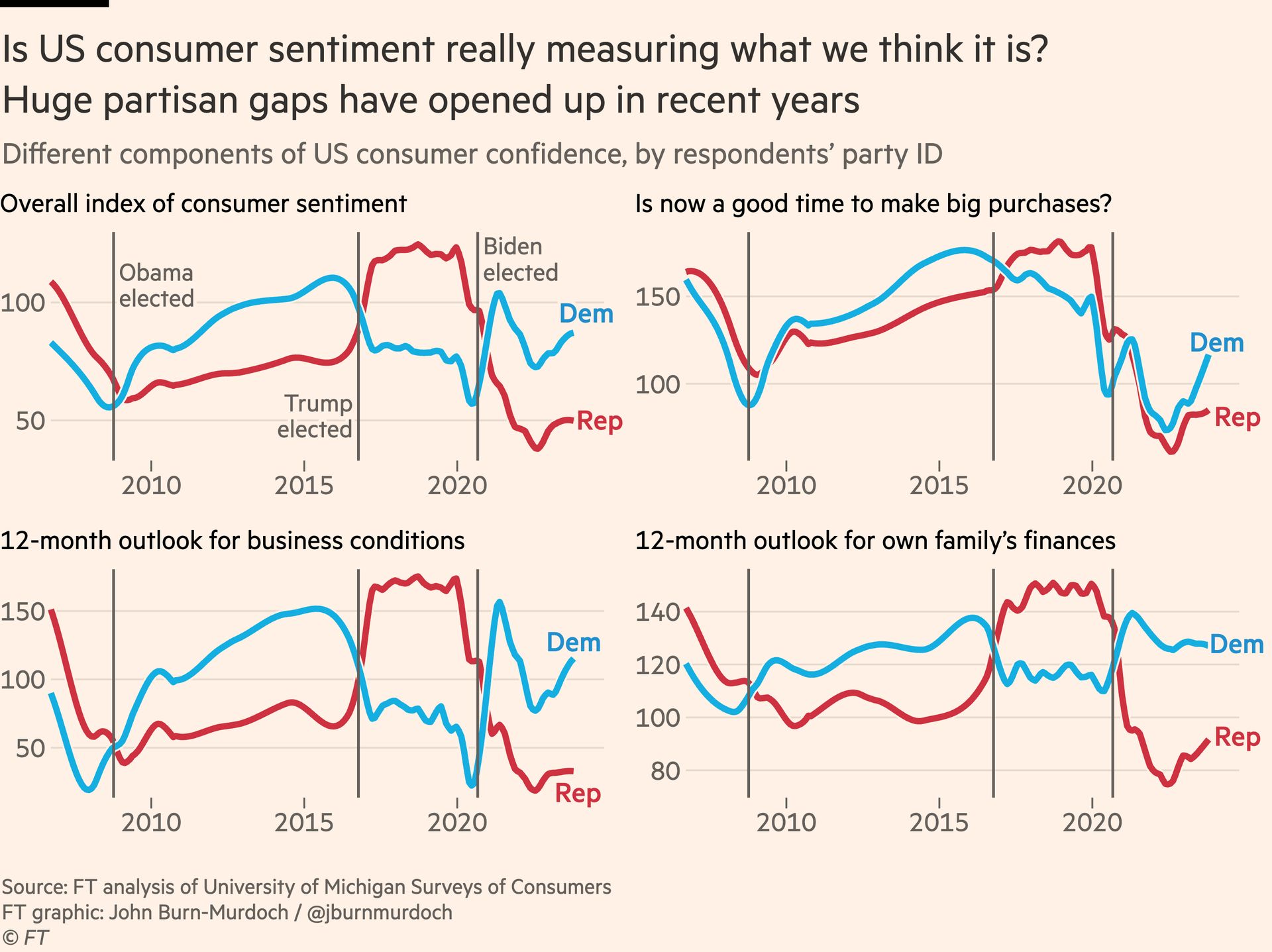尊敬的用户您好,这是来自FT中文网的温馨提示:如您对更多FT中文网的内容感兴趣,请在苹果应用商店或谷歌应用市场搜索“FT中文网”,下载FT中文网的官方应用。
Something weird is happening in America.
GDP growth for Q3 was just revised up from an already scorching 4.9 per cent to 5.2 per cent, more Americans have
jobs than at any time in history, but the public is up in arms about
economic conditions, with consumer
confidence dropping to a six-month low. There really is no pleasing some people.
美国发生了一些奇怪的事情。第三季度的国内生产总值(GDP)增长率刚刚从已经很高的4.9%上调至5.2%,美国有史以来就业人数最多,但公众对经济状况感到不满,消费者信心降至六个月低点。有些人真的是无法满足。
With headline indicators in such rude health, we would expect the number of Americans who think they’re better off than this time last year to outnumber those who say they’re worse off by about 25 percentage points. Instead, the reportedly worse-offs outnumber the better-offs by ten points in the
latest University of Michigan’s index of Current Economic Conditions.
鉴于这些主要指标的良好表现,我们预计,自认为比去年同期更好的美国人的数量,将比认为自己更糟糕的人多出大约25个百分点。然而,在
最新的密歇根大学(University of Michigan)当前经济状况(Current Economic Conditions)指数中,据报道认为自己更糟糕的人比认为自己更好的人多出十个百分点。
I know what you’re thinking: inflation explains all of this. People
really hate rising prices, and are reminded of them every time they buy something. Inflation’s salience drowns out other more distant or intangible gains. It’s certainly a good theory, but countries all around the world have faced steep inflation. Many
steeper than the US. Presumably their consumers are also much more pessimistic than we would expect?
我知道你在想什么:通货膨胀可以解释这一切。人们
真的讨厌物价上涨,并且每次购买东西时都会被提醒。通货膨胀的显著性淹没了其他更为遥远或抽象的收益。这当然是一个好的理论,但世界各地的国家都面临着严重的通货膨胀。许多国家的通货膨胀
比美国还要严重。可以推测,他们的消费者也比我们预期的要悲观得多吗?
Well, no actually. Extending an original
analysis by X user Quantian1, I have calculated expected consumer sentiment for a set of countries based on their underlying economic indicators, and compared it to actual sentiment. Relative to the eve of the pandemic, US consumers now appear gloomier than the French, the Germans and even the British. The Europeans all feel about as confident as one might expect based on how their economies are performing. Disproportionate doom seems to be a new American affliction.
实际上并不是这样。
在X用户Quantian1的原始分析基础上,我根据各国的基本经济指标计算了预期的消费者情绪,并将其与实际情绪进行了比较。与疫情爆发前相比,美国消费者现在似乎比法国、德国人甚至英国人更为悲观。欧洲人的信心水平与他们的经济表现相符。不成比例的悲观情绪似乎是美国人的新困扰。
So what’s going on? Last weekend
FocalData ran a poll for me, asking a representative sample of 2,000 US adults whether they thought economic circumstances had improved or deteriorated over recent years. The results were startling: Americans are consistently wrong in the negative direction on almost every measure we polled. By huge margins, they believe inflation is still rising (
it’s falling), that it has outstripped wage growth (
wages have outpaced prices), and that they have become less wealthy (
they’ve become much wealthier).
那么到底发生了什么?上个周末,
FocalData为我进行了一项调查,询问了一组代表性的2000名美国成年人,他们认为近年来的经济状况有所改善还是恶化。结果令人震惊:美国人在我们调查的几乎每个指标上都持续错误地朝着负面方向。他们普遍认为通货膨胀仍在上升(实际上正在下降),通货膨胀已超过工资增长,以及他们变得更加贫穷(实际上他们变得更加富有)。
Attempts to justify this sense of gloom often emphasise the challenges faced by less prosperous groups, but this also goes counter to the evidence. One explanation I heard is that the despondency comes from young people struggling with runaway rents. But
wages have risen faster for them than the old, outpacing rents. Plus young consumers are the most positive, per the Michigan survey.
试图为这种沮丧感找到理由的尝试,通常强调较不富裕群体面临的挑战,但这也与证据相悖。我听到的一个解释是,这种沮丧来自年轻人在应对飞涨的租金方面的困难。但是他们的
工资增长速度比老年人更快,超过了租金的增长速度。此外,根据密歇根州的调查,年轻消费者是最积极的。
Similarly,
wages have risen faster for those on the lowest incomes,
reversing more than a third of the increase in wage inequality over the past four decades. Wealth has
risen for the least and most wealthy alike.
The most striking response from our survey concerned the sense of longer-term progress. Large majorities of Americans think the median income today pays for a worse lifestyle than 30 years ago (
demonstrably false), and that poverty is higher than it was a generation ago (
it has plummeted). One particularly revealing statistic is that Americans’ assessment of their own financial
situation has barely budged over the past five years
, but their
rating of the national economy has worsened steeply. It seems they have decided that the vibes are bad, so things must be going badly for most other people, even if not for themselves.
我们调查中最引人注目的反应涉及到长期进展的感觉。绝大多数美国人认为,如今的中等收入无法维持比30年前更好的生活方式(
事实上是错误的),而贫困程度比一代人前更高(实际上已经大幅下降)。一个特别有启示性的统计数据是,美国人对自己的财务状况的评估在过去五年几乎没有变化,但他们对国家经济的评级却急剧恶化。似乎他们已经决定,氛围不好,所以对大多数其他人来说情况肯定不好,即使对他们自己来说不是这样。
Political affiliation is also key to understanding how economic sentiments are separating from economic reality in the US. One question from the Michigan survey asks whether people think now is a good time to buy big household items. When the pandemic hit, Democrats and Republicans alike moved sharply towards “not a good time to buy”. But just months later, when Joe Biden won the presidential election — while Covid-19 still raged — Democrats suddenly declared conditions ripe for purchases of new fridge-freezers. Republicans did not.
政治派别对于理解美国经济情绪与经济现实的分离也是关键。密歇根州的一项调查问卷中,有一个问题问人们是否认为现在是购买大型家庭用品的好时机。当疫情爆发时,无论是民主党还是共和党,都明显倾向于“不是购买的好时机”。但仅仅几个月后,在新冠疫情仍然肆虐的情况下,当乔•拜登(Joe Biden)赢得总统选举时,民主党突然宣称购买新冰箱冷柜的条件成熟。而共和党则没有这样做。
It seems US consumer sentiment is becoming the latest victim of
expressive responding, where people give incorrect answers to questions to signal wider tribal political or social affiliations. My advice: if you want to know what Americans really think of economic conditions, look at their spending patterns. Unlike cautious Europeans, US consumers are back on the pre-pandemic trendline and
buying more stuff than ever.
看起来,美国消费者情绪正在成为表达回应的最新受害者,人们在回答问题时给出不正确的答案,以示更广泛的政治或社会隶属关系。我的建议是:如果你想知道美国人对经济状况的真实看法,看看他们的消费模式。与谨慎的欧洲人不同,美国消费者回到了疫情前的趋势线,并购买了更多的东西。
Survey details and other methodology
Survey of Americans’ views on economic trends: Focaldata carried out an online survey of 2,217 US adults between 25 and 27 November 2023. Respondents were weighted to be representative of the US adult population.
Actual vs expected consumer confidence analysis: expected consumer confidence was estimated using a set of linear regression models which which established the statistical association between monthly consumer confidence and a range of economic indicators between 1988 and 2019 for each country. Those models were then used to predict what consumer confidence would have been for each month in each country since January 2020 had those same statistical relationships held true.
调查细节和其他方法论
美国人对经济趋势的观点调查:Focaldata在2023年11月25日至27日对2217名美国成年人进行了在线调查。受访者的权重经过调整,以代表美国成年人口。
实际与预期消费者信心分析:预期消费者信心是通过一组线性回归模型进行估计的,这些模型建立了1988年至2019年期间每个国家月度消费者信心与一系列经济指标之间的统计关联。然后,利用这些模型预测了自2020年1月以来每个国家每个月的消费者信心,假设这些统计关系仍然成立。



